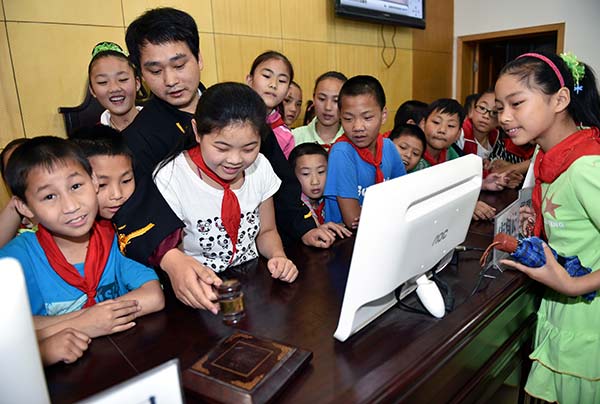
A judge helps a primary school student to use a gavel at an open day event at the No 1 People's Court in Fengjie county, Chongqing, in May. RAO GUOJUN/CHINA DAILY
Judges and officials are stepping down as changes designed to streamline China's judicial system prompt concerns about long hours, low pay and the pressure of work.
Jiang Yangbing was a judge at an intermediate people's court in Zhanjiang city, Guangdong province, until June last year, when he quit his post because of stressful working conditions and concerns about new guidelines related to independent verdicts.
The 33-year-old lawyer said a number of cases related to administrative procedures or property disputes had left him with the double challenge of trying to quell dissent that could have sparked a mass incident, such as public protests, while also combating interference from the government departments involved.
"I was so worried when the litigants argued or even fought in front of me. It always upset me. I was desperate to escape," he said.
Jiang resigned just a month before the July implementation of a series of pilot programs to reform the judiciary, initiated by the central leadership in 2013.
He is the tip of an iceberg: Since January, 50 judges have voluntarily left the Shanghai judicial system, according to reports in the Yangcheng Evening News. The resignations followed the departure of 105 judicial officers, including 86 judges, in the city last year, a rise of 90 percent from 2013.
Mu Ping, president of the Beijing High People's Court, confirmed the talent drain, saying that more than 500 legal officers in the capital have resigned in the past five years.
Some insiders accepted that more judges will resign as the reform process deepens, but insisted that the changes will prove beneficial in the long run.
He Xiaorong, director of the Judicial Reform Office under the Supreme People's Court, China's top court, said the pain caused by the process will be temporary, and urged judicial officials to view the reforms though a long lens.
In September, President Xi Jinping ratified higher salaries for court officials and prosecutors, and also signed off new administrative procedures to ensure greater independence for judges and legal officers and challenge the widely held misconception that they are little more than civil servants .
Zhang Xiaojin, a judge at the Beijing Intellectual Property Court, said reform always impinges on someone's interests, "but I strongly feel that the aim is to provide us (legal officials) with more protection and benefits. That's why I intend to stay in my post.
"I've witnessed the achievements fostered by the reforms, including the setting up of the IP court last year, which has made the conduct of cases more professional," he said. "I'll carry on, and I hope the reforms will prove positive and successful."
Independent oversight
In 2009, Jiang was excited to be appointed as a full judge, qualified to oversee disputes independently. The promotion meant he was freed from the constraints of the "judicial panel" system, under which a team of judges who may not have even been present in court presided over verdicts and sentencing.
However, a year later, he found himself deeply depressed because of interference by litigants, who often refused to accept his verdicts and lobbied against them, and, occasionally, from governmental departments who pushed for retrials if they were dissatisfied with the outcomes of cases.
"That interference made it hard for me to do my job properly," he said. "Some litigants didn't understand the law and attempted to overturn my verdicts by threatening and harassing me.
"I was concerned that the litigants' extreme behavior could spark a mass incident, but the worst thing was that I didn't know what to do," he said. "I was deeply concerned about my personal security, and I was also being pressured by some government departments that were unhappy with my rulings."
Lin Jinbiao, a judge at the Guangdong Provincial High People's Court, said that he was pleased to see that measures to eliminate outside interference are among the top priorities of the reform process.
The Supreme People's Court now requires every court to collate and record all evidence and legal advice submitted during cases as a means of maintaining impartiality and ensuring independent verdicts.
"It is progress, but outside interference is a stubborn disease in our courts. It will be difficult to cure, but we'll just have to follow developments and see if the new rules are effective. After all, independent assessment of cases is the key to ensuring fair verdicts," Lin said.


















































